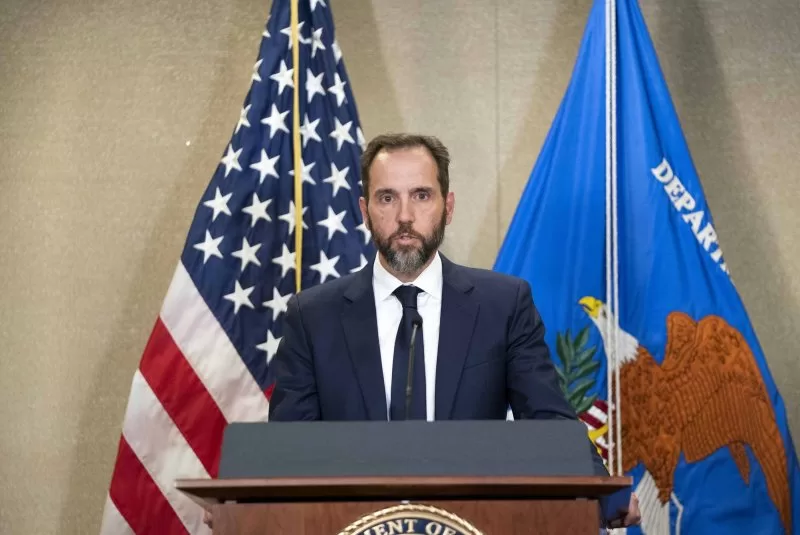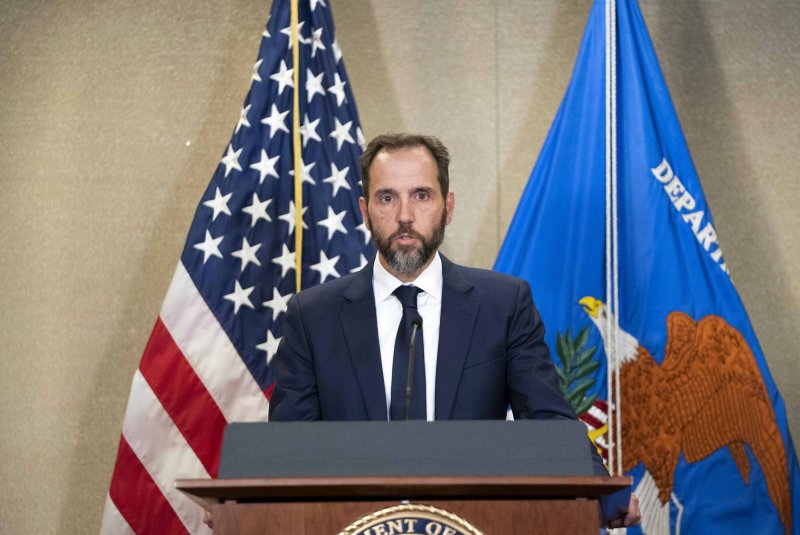1 of 4 | “The government’s position on the merits of the defendant’s prosecution has not changed,” the special counsel’s office wrote Monday in its filing. “But the circumstances have.”
Recently, Jack Smith (pictured in 2023) indicated his intent to wrap-up the two ongoing criminal cases and to then resign with his team before Inauguration Day on January 20. File Photo by Bonnie Cash/UPI | License Photo
Nov. 25 (UPI) — Special counsel Jack Smith has now moved to drop all felony charges against President-elect Donald Trump in connection to his alleged role in seeking to overturn the 2020 presidential election, which lead to the deadly Jan. 6 U.S. Capitol attack, and a supposed mishandling of classified documents.
“The government’s position on the merits of the defendant’s prosecution has not changed,” the special counsel’s office wrote Monday in its filing. “But the circumstances have.”
Recently, Smith indicated his intent to wrap up the two ongoing criminal cases against Trump and to then resign with his team before Inauguration Day on January 20.
Trump spokesman Steven Cheung says Monday’s decision by the special counsel ends the “unconstitutional federal cases” against Trump, characterizing it as a “major victory for the rule of law.”
The president-elect was indicted in August 2023 on four felony counts for the alleged conspiracy to defraud the United States, conspiracy to obstruct an official proceeding, obstruction of and attempt to obstruct an official proceeding, and conspiracy against rights. But the case was put on hold for months as Trump’s legal team made efforts to go around the prosecution.
The former and future president made it clear that he intended to get rid of Smith once he takes office. During an October radio interview, Trump said that he will fire Smith “within two seconds” of becoming president again.
On Monday, Smith’s office wrote that its intent to drop all four felony charges will be consistent with the U.S. Justice Department’s long-held tradition of not charging a sitting American president with a crime.
“That prohibition is categorical and does not turn on the gravity of the crimes charged, the strength of the government’s proof, or the merits of the prosecution, which the government stands fully behind,” Smith wrote in a six-page filing with U.S. District Judge Tanya Chutkan in Washington, adding that DOJ’s position is that the U.S. Constitution “requires that this case be dismissed before the defendant is inaugurated.”
This arrived days after New York Judge Juan Merchan ruled Trump’s sentencing date for his 34 criminal convictions be put on hold, with Trump’s attorneys arguing the case should be tossed outright as Trump returns to the White House.
After Trump’s November re-election against Vice President Kamala Harris, Smith was torn between “two fundamental and compelling national interests,” the filing states.
Trump was indicted by a grand jury for the alleged criminal conspiracy to block and overturn results in the 2020 election won by President Joe Biden and Harris. Smith had overseen the case as well as a second criminal case in Florida involving the alleged mishandling of classified documents.
“On the one hand, the Constitution’s requirement that the president must not be unduly encumbered in fulfilling his weighty responsibilities,” Smith’s team wrote, “and on the other hand, the nation’s commitment to the rule of law and the longstanding principle that ‘[n]o man in this country is so high that he is above the law.'”
Meanwhile, the office of the outgoing special counsel added that the new and current outcome “is not based on the merits or strength of the case against the defendant.”
Federal regulations require a report from Smith summarizing the investigation into Trump’s alleged crimes. However, it’s unclear if it will be publicly available.
“The American people and President Trump want an immediate end to the political weaponization of our justice system,” Cheung said.
The two state cases against Trump in New York and Georgia will continue in legal proceedings that Trump, as president, will have no constitutional power in which to interfere.

